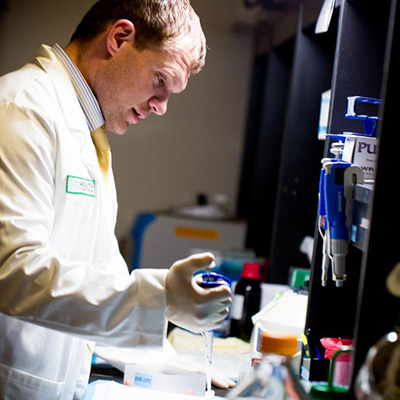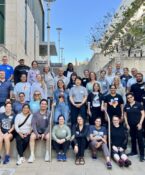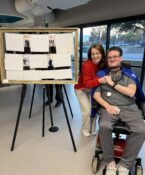Blood test detects pre-Alzheimer’s in Mexican-Americans with 96 percent accuracy
By Jan Jarvis
A blood test developed at UNT Health Science Center detects pre-Alzheimer’s disease in asymptomatic Mexican-Americans with 96 percent accuracy.
The test used blood samples provided by participants in the Health & Aging Brain among Latino Elders (HABLE) study. Hundreds of older Mexican-American residents from the Fort Worth area have participated in this study, which seeks to understand aging in this underserved population.
“These were not people who came into the clinic because they had symptoms of Alzheimer’s,” said Sid O’Bryant, PhD, Director of the Center for Alzheimer’s & Neurodegenerative Disease Research. “These were people in the community whose blood test identified that they had mild memory impairment, which can be pre-Alzheimer’s disease in some people.”
The study further validates UNTHSC research showing a blood test performed as part of a routine physical in a doctor’s office could be used to detect very mild Alzheimer’s – allowing treatment to begin as early as possible. It is especially significant that the blood tests came from participants in the HABLE study, since studies show that Mexican-Americans generally receive their health services in community-based primary care offices, O’Bryant said.
The research, which appears in the Journal of Alzheimer’s Disease, also suggests that blood-based biomarkers for Mexican-Americans may change over time and differ from biomarkers in non-Hispanic whites.
“We think that the biology driving Alzheimer’s may change depending on the stage of the disease,” O’Bryant said.
It is believed that metabolic dysfunction contributes to Alzheimer’s in Mexican-Americans, who are known to have a high incidence of diseases such as diabetes, said Melissa Edwards, M.A., Research Specialist, a University of North Texas graduate student who is the lead author of the study. In non-Hispanic whites, the inflammatory/vascular dysfunction profile is believed to contribute to Alzheimer’s.
But this study showed that inflammation also played a role in pre- Alzheimer’s among Mexican-Americans.
“It could be that inflammation is driving very early memory loss among Mexican Americans,” O’Bryant said. “But once the person has Alzheimer’s, metabolic changes become more important.”
An understanding of the differences in biomarker profiles could make it possible for drugs to be personalized for each patient’s individual needs, O’Bryant said.
“Now we have to figure out who should receive which therapy,” he said. “Anti-inflammatory drugs may be more effective for Mexican-Americans with very early memory loss but diabetes medication may be more appropriate for some patients once they have the disease.”






Social media